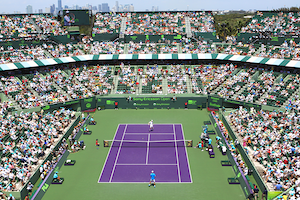 Over the years, politics and sports have intersected many times. Perhaps the most infamous example is the 1972 Munich Olympics, when Israeli athletes were taken hostage by Palestinian radicals and subsequently killed in a rescue attempt. With tennis becoming more internationalized, these lines were destined to meet.
Over the years, politics and sports have intersected many times. Perhaps the most infamous example is the 1972 Munich Olympics, when Israeli athletes were taken hostage by Palestinian radicals and subsequently killed in a rescue attempt. With tennis becoming more internationalized, these lines were destined to meet.
At the Australian Open this year, while Serb Novak Djokovic and Bosnian-American Amer Delic applauded each other’s superb shots and cordially shook hands after the match. Their fans had a brawl outside the stadium which had to be interrupted by police and led to a couple of people requiring medical attention. Now, this past week, Shahar Peer, an Israeli female player, was prohibited entry into the United Arab Emirates (UAE) for the Dubai tournament for which she automatically qualified by virtue of her ranking.
Diplomacy is sometimes a messy affair. UAE officials were hoping to sweep the Peer matter under the rug by citing their country’s lack of diplomatic relations with Israel. With pro-Palestinian sentiments heightened in light of Israel’s recent incursion into Gaza, Emirate officials’ concerns over the outbreak of violence were legitimate. It would have been a tragedy had Ms. Peer’s participation resulted in her, her fellow competitors or audience members becoming the victim of a politically motivated act. Unfortunately, terrorism is a common event in that part of the globe. Moreover, sports is after all a business, the sponsors have the right to protect their investment. If spectators decide not to attend in protest, they would lose money which may have influenced their making Peer a sacrificial lamb. Still, the perception remains that the UAE’s decision was also driven by ulterior motives. The incident provoked outrage from the WTA and Peer’s own government. Yet, Israel is not blameless in this game. A few years ago, it prevented the Palestinian soccer team from traveling for a World Cup qualifying match.
No matter how much one would like to divorce sports and politics, it may be impossible. As the athletes have used the sports stage as a forum to display their political grievances. Who can forget the 1968 Mexico Olympics where Black American medallists on the podium raised their arm in salute to black power making a statement against their country’s segregationist policies as the U.S. national anthem played?
The primary objective of the ATP and WTA over the last few years has been to expand the sports’ worldwide appeal while concurrently increasing their revenues. As such, these organizations have been chasing the moneys from untapped markets in the Far and Middle East. With so many complex political issues in these regions, not least of which is a lack of democratic rule, spillage over into the sports arena will occur from time to time. Hopefully, this situation has taught the WTA and the ATP a lesson so that they will be more careful in the future in choosing their bedding partners and not to allow greed to be the guiding factor. In trying to remedy the Peer issue, the WTA has fined the Dubai tournament, compensated Peer monetarily as well as ranking points wise and set up fresh guidelines for similar situations. For its part, the UAE will allow Andy Ram, an Israeli, to compete in the men’s event this week.
In an ideal world, sports and politics would remain parallel. Often, when the lines between the two are blurred, there are no winners. The players suffer because their livelihood is affected. The public loses because it is unable to enjoy the sport. In fact, next month, Sweden and Israel will play to an empty stadium due to security concerns. Sadly, this may be the sports’ new reality as these two issues continue to cross paths in this ever-shrinking world.




